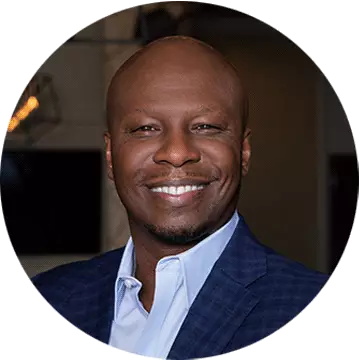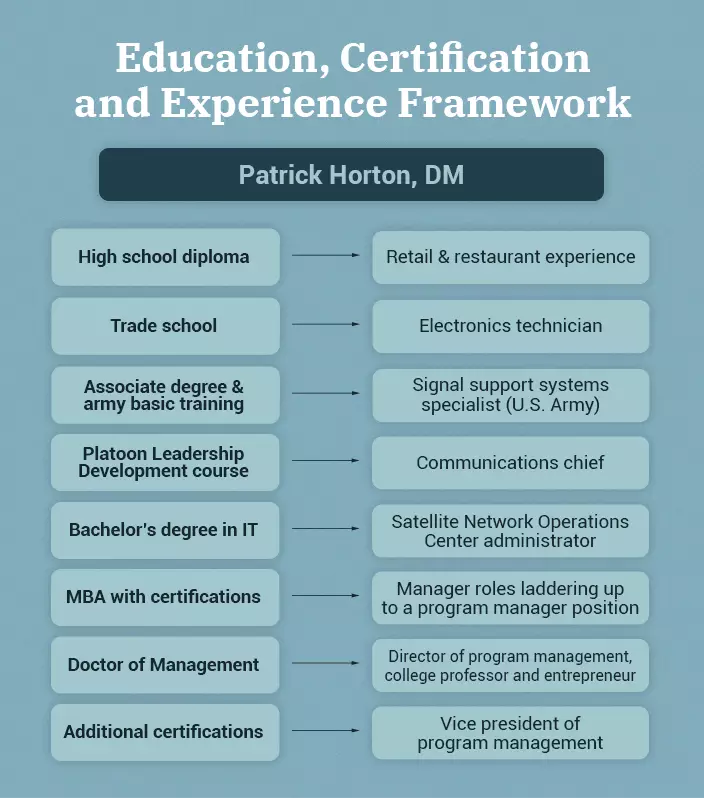5 steps to develop career goals (and a road map to reach them)
The conversation about developing career goals often revolves around the goals themselves, but I’d like to take a different angle.
In my experience, I’ve found that it’s important to take a step back to examine why we create career development goals in the first place. To find your why, you need a personal vision statement. Here’s how to create one!
Find your motivation
When I say “personal vision statement” I’m not talking about a generic goal of learning, growing or even building a legacy. Your motivation should be specific to you.
Before you declare your dream is to be an astronaut or a celebrity, I want you to look in the mirror, fresh-faced, and ask yourself these simple questions:
- What do I want to achieve in my career?
- What am I willing to invest to get it?
What do you want to achieve?
Simply put, you need to decide what success looks like to you when you retire at the end of your career. Is it setting financial goals, and are you on track to meet them? Is it reaching a certain position in leadership? Is it building a business from the ground up? Is it turning a passion into a profession? Only when you have a clear goal can you start working toward it.
Understand your investment
Once you have your end goal in place, you have to decide exactly what you’re willing to pay in terms of financial resources, effort, focus and time to achieve it. That can mean investing time, money and energy to build a business as an entrepreneur. It can mean taking on stretch assignments to grow your career. It can mean going back to school for a bachelor’s or graduate degree.
For me, becoming a VP meant doing whatever was necessary to reach a position where I could serve the people on my team and ensure they, too, were successful. It meant earning multiple degrees and certifications, putting in 80-hour workweeks and managing clients who weren’t always easy.
This isn’t true for everyone. That’s why you have to be honest about what you want and what you’re willing to do to get it. Only then can you start creating your career goals. Now let’s get into the logistics of it!
Understand what kind of worker you are
No one can predict how they’ll change over time, but you can ask yourself a few key questions to ascertain your preferred working style. For example:
- Are you the type of worker who seeks out opportunities for promotion, or do you primarily seek a sense of professional fulfillment?
- Is an entrepreneur lifestyle a better fit for you because you don’t like being micromanaged or expected to be at your desk every day at 8 a.m.?
Or maybe you’re like me. I can’t wait for every opportunity to climb the corporate ladder. I look for ways to add side hustles to my portfolio and create additional revenue streams. I want to be able to live comfortably and travel regularly while giving back to my family, friends and community. As a result, I have to be relentless about looking for opportunities to climb the ladder and expand my side hustles.
The best part? I love it. I love the attention of being successful as well as the respect that comes with having integrity and working hard. I also love being generous with my knowledge. If I make it, I want everyone around me to make it.
So, who are you?
You need to consider your interests and life passions when developing career goals. Think about what excites you and what you could truly enjoy doing every day for 20 to 30 years. As the old saying goes, “Don’t fool yourself!” Please say this a second time slowly and think about it three layers deep. “Don’t fool yourself” into trying to be someone you aren’t. Be your authentic self and align your career goals with your interests. Be logical in your thinking!
Identify your capabilities and strengths
Your capabilities and strengths will inevitably inform your career goals. Start by listing your skills and talents; then, consider how you can apply them to a career.
As a VP, I leverage strengths like strategic portfolio management, stakeholder engagement, risk management and personnel management, to name a few. Was I born with these skills? No, but I had both aptitude and interest that I applied toward learning them.
On the flip side, I will never be a statistician. I don’t do numbers to that level, nor do I possess the drive to do that type of work. As a result, my goals have moved away from a career in statistical analysis, and that’s OK.
Your situation is uniquely your own. Nothing wrong with being brutally honest about what you do well and what you don’t so that you pursue the right career for you.
Create a career-ladder road map
As I mentioned, to understand where your career path can take you, you need to know where you would you like to start and where would you like to end. Once you identify either end of that spectrum, research the actual job titles that connect the two (and the responsibilities inherent to each).
I started out as an IT manager , for example . My career road map at that time looked like this, although it may not be the same for everyone:
- IT project manager
- Contracts program manager
- Director of programs
- Vice president of program management
As you figure out your functional career path, figure out a realistic timeline for achieving it. What does that involve in terms of education, certifications and experience?
As always, ensure you develop career goals that are SMART (specific, measurable, achievable, relevant and time-bound) once you identify a potential pathway. The method you use to track your progress should challenge you, provide clarity as to what your goals are, allow mentors and peers to clearly dissect it, and provide you feedback. If it does all that, it will be a visual representation of your commitment to your goals.
For me, working backward from my ultimate goal made the most sense. I wanted to be a VP, and so I identified all the positions I needed to hold to get there. Once I had those positions in my line of sight, I could figure out what each one entailed in the way of training, soft skills and experience.
Ask yourself what type or size of organization you need to work for before you can ascend to your desired role. Do you need the experience of working for other larger or smaller organizations to achieve your goal? After you have an outline for your career ladder, it’s time to figure out how to climb each rung. That’s called a road map, and here’s what that includes.
1. Mentorship and coaching advice for career development
Actively learning from professionals who are working in the positions and career fields you are interested in growing into can assist you in achieving your career goals.
For example, I regularly solicit advice from my company president and owner/CEO regarding what my next steps should be in my career. His insights are priceless.
Mentors can help you optimize your plan and avoid pitfalls that stagnate your growth. They can also offer insight and advice tailored to the industry you’re in or want to be in. If my next goal is to become president of a company and take my LLC to the next level, who better to ask than top-tier people succeeding in those roles today?
2. The right organizational environment
Consider whether your organization offers the growth potential you need to reach your goals. Can your organization offer you the mobility to grow and achieve your career goals, or do you have to transition to a new organization? Always be loyal to the home team first, which is you and your family.
3. A career-goals tracker with timeline, position requirements and titles
Developing a framework or matrix spreadsheet where you list each career goal, the date or timeline you want to achieve the goal, and what’s required to achieve it will help you stay accountable to completing the goal. I recommend a tracker that includes at least five years of progress.
Also, map out all of your previous goals so that you can see the entire picture of your working professional life.
Reaching each goal won’t be easy. So, it might help to enlist a career-goals partner to help keep you accountable. Share your goals — and your achievements — for an added layer of accountability that motivates you to keep going.
Here’s an example of what that looks like for me:
4. A definition of success
Career development goals should lead to a sense of fulfillment, and that might not always align with your organization’s goals. What counts as success to you may mean something different to your peers or employer. Know whether you’re going for the promotion, the paycheck or personal gratification. You may have to expand your focus to include your employer’s goals too, but yours should always be top priority.
5. Technology and tools that aid your journey
To stay competitive and achieve your career goals, you may need to learn and utilize business technology applications. Do you need to learn how to use AI to streamline your workflow, for instance? Do you need to start using LinkedIn to leverage contacts and build influence in your ascent to the top?
If you’re not sure where to start, research. I have read books on what kinds of tools executives need to use to be better at their jobs. Mentors can also provide insight as can networks and colleagues.
This is just the beginning. I hope you get inspired to develop a custom plan for yourself. Remember, the goal isn’t for me or anyone else to tell you exactly what to do, step by step. The goal is to provide an abundance of ideas that let you take in the good and throw out the bad. Best of luck developing your career goals. I’m sure you will be successful.

ABOUT THE AUTHOR
Dr. Patrick C. Horton, MBA, DM/IST, is the vice president of program management for Tampa Microwave, a college professor and a veteran U.S. Army sergeant. He earned his Bachelor of Science in Information Technology, Master of Business Administration and Doctor of Management with a specialization in Information Systems at University of Phoenix. He launched his business, Professional Career Transformations, in 2021 as a way to guide and encourage others to identify and pursue their career goals. He is a former member of Vistage Executive Coaching Group and a recipient of the Purple Heart in Operation Iraqi Freedom, and he lives in sunny Florida. Learn more about Dr. Horton and his commitment to helping others achieve their highest level of success by visiting his website and be sure to watch this video on career diversification
on his YouTube channel.

ABOUT THE REVIEWER
Jessica Roper, University of Phoenix director of Career Services, is a seasoned leader with over 15 years of experience in leadership within higher education. She has honed her expertise in student services and career development and is passionate about helping others discover and refine their skills.
This article has been vetted by University of Phoenix's editorial advisory committee.
Read more about our editorial process.
Read more articles like this:




